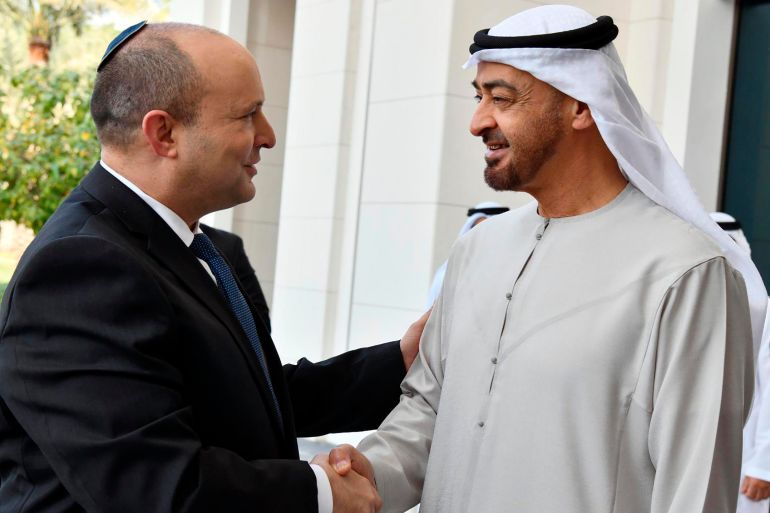Israel signs first Arab free trade agreement with UAE
Deal is Israel’s first big trade accord with an Arab state, after establishing ties in 2020.

Israel has signed a free trade agreement with the United Arab Emirates, its first big trade accord with an Arab state and a move aimed at boosting trade between the two Middle Eastern nations.
The pact was signed in Dubai by Israel’s Minister of Economy and Industry Orna Barbivai and her counterpart, UAE Minister of Economy Abdulla bin Touq al-Marri, on Tuesday after months of negotiations.
Recommended Stories
list of 3 items- list 1 of 3Iraq passes law to criminalise relations with Israel
- list 2 of 3Turkey FM visit to Israel a sign relations are warming
- list 3 of 3Analysis: With MBZ as president, is it time for a US-UAE reset?
“Done,” Israel’s Ambassador to the UAE Amir Hayek said on Twitter, replying to another tweet he posted earlier saying “the UAE and Israel will sign FTA in the next hour”.
President of the UAE-Israel Business Council Dorian Barak said the trade agreement defined tax rates, imports and intellectual property, which would encourage more Israeli companies to set up offices in the UAE, particularly in Dubai.
The Council predicts there will be almost 1,000 Israeli companies working in or through the UAE by the end of the year, doing business with South Asia, the Far East and the Middle East.
“The domestic market doesn’t represent the entirety of the opportunity. The opportunity is really setting up in Dubai, as many companies have, in order to target the broader region,” Barak said.
Ahead of the signing, Israel’s economy ministry had said the accord would remove tariffs on 96% of goods, including food, agriculture, cosmetics, medical equipment and medicine.
The UAE predicts that the Comprehensive Economic Partnership Agreement, as the accord is known, would boost bilateral trade to more than $10bn a year within five years.
“Our agreement will accelerate growth, create jobs and lead to a new era of peace, stability, and prosperity across the region,” the Emirati trade minister, Thani al-Zeyoudi, said on Twitter.
“Together we will remove barriers and promote comprehensive trade and new technologies, which will form a solid foundation for our common path, will contribute to the well-being of citizens and make it easier to do business,” Barbivai said on Monday.
The agreement has been signed amid escalating violence in occupied East Jerusalem and the occupied West Bank.
The UAE foreign ministry on Monday condemned the storming of the Al-Aqsa Mosque compound in Jerusalem on Sunday by “extremist settlers under the protection of Israeli forces”.
Later on Sunday, ultra-nationalist Israelis marched through Palestinian areas of the Old City and attacked Palestinians while chanting racist anti-Arab and anti-Palestinian songs.
The foreign ministry, in the written statement, also asked “Israeli authorities to take responsibility for reducing escalation and ending all attacks and practices that lead to the continuation of tensions while underscoring the need to exercise maximum restraint to avoid further instability”.
On the same day the statement was issued, invited media were told they could no longer attend the signing. No reason was given for the sudden change.
Al-Aqsa Mosque is the third holiest site in Islam and is known in Judaism as the Temple Mount. One of the outer walls of the Temple Mount, the Western Wall, is the holiest site in Judaism.
Israel’s Barbivai told Israeli radio on Tuesday she had heard “nothing out of the ordinary” about the Al-Aqsa Mosque violence so far during her visit to the UAE.
For the UAE, the deal with Israel is its second bilateral free trade agreement after signing a similar accord with India in February. It is in bilateral trade talks with several other countries, including Indonesia and South Korea.
The UAE has been aggressively pursuing these deals in a bid to strengthen its economy and status as a major business hub following the hit it took from the coronavirus pandemic.
Israel and the UAE established ties in September 2020 in a deal brokered by the United States that broke with decades of Arab policy that had called for a Palestinian state before ties with Israel.
Bahrain and Morocco also recognised Israel in the same year.